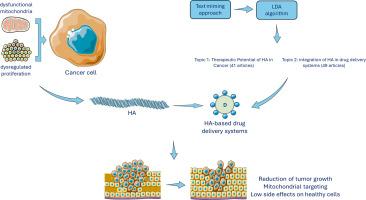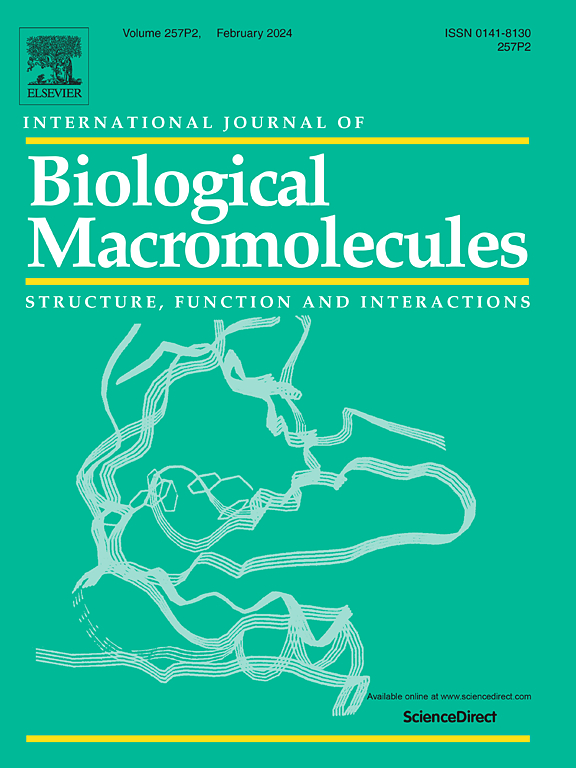Targeting mitochondria in Cancer therapy: Machine learning analysis of hyaluronic acid-based drug delivery systems
IF 8.5
1区 化学
Q1 BIOCHEMISTRY & MOLECULAR BIOLOGY
International Journal of Biological Macromolecules
Pub Date : 2024-12-01
DOI:10.1016/j.ijbiomac.2024.137840
引用次数: 0
Abstract
Background
Mitochondrial alterations play a crucial role in the development and progression of cancer. Dysfunctional mitochondria contribute to the acquisition of key hallmarks of cancer, including sustained proliferative signaling, evasion of growth suppressors, and resistance to cell death. Consequently, targeting mitochondrial dysfunction has emerged as a promising therapeutic strategy. Hyaluronic acid (HA), a naturally occurring glycosaminoglycan, has garnered significant attention due to its multifaceted roles in cancer biology.
Methods
We employed a Systematic Literature Review (SLR) approach to examine a collection of 90 scientific publications using a text mining technique leveraging the Latent Dirichlet Allocation (LDA) algorithm.
Results
The result of this activity, performed through the MySLR digital platform, allowed us to identify a set of two distinct topics representing the research domain. Specifically, Topic 1 comprised 41 papers, while Topic 2 comprised 49 papers.
Conclusions
The computational analysis highlighted that the integration of HA into drug delivery systems represents a promising approach to enhance the effectiveness and safety of cancer therapies. The discussed clinical trials provided compelling evidence of the potential of HA-based treatments in targeting cancer cells while minimizing adverse effects on healthy tissues.

癌症治疗中的线粒体靶向:基于透明质酸的药物输送系统的机器学习分析。
背景:线粒体的改变在癌症的发生和发展中起着至关重要的作用。线粒体功能失调是导致癌症获得关键特征的原因,包括持续的增殖信号、对生长抑制因子的逃避以及对细胞死亡的抵抗。因此,针对线粒体功能障碍的治疗策略前景广阔。透明质酸(HA)是一种天然糖胺聚糖,因其在癌症生物学中的多方面作用而备受关注:我们采用了系统文献综述(SLR)方法,利用潜狄利克特分配(LDA)算法的文本挖掘技术,对90篇科学出版物进行了研究:结果:通过 MySLR 数字平台开展的这项活动,我们确定了代表研究领域的两个不同主题。具体来说,主题 1 包括 41 篇论文,而主题 2 包括 49 篇论文:计算分析突出表明,将 HA 整合到给药系统中是提高癌症疗法有效性和安全性的一种可行方法。所讨论的临床试验提供了令人信服的证据,证明了基于 HA 的疗法在靶向癌细胞的同时最大限度地减少对健康组织的不良影响的潜力。
本文章由计算机程序翻译,如有差异,请以英文原文为准。
求助全文
约1分钟内获得全文
求助全文
来源期刊
CiteScore
13.70
自引率
9.80%
发文量
2728
审稿时长
64 days
期刊介绍:
The International Journal of Biological Macromolecules is a well-established international journal dedicated to research on the chemical and biological aspects of natural macromolecules. Focusing on proteins, macromolecular carbohydrates, glycoproteins, proteoglycans, lignins, biological poly-acids, and nucleic acids, the journal presents the latest findings in molecular structure, properties, biological activities, interactions, modifications, and functional properties. Papers must offer new and novel insights, encompassing related model systems, structural conformational studies, theoretical developments, and analytical techniques. Each paper is required to primarily focus on at least one named biological macromolecule, reflected in the title, abstract, and text.

 求助内容:
求助内容: 应助结果提醒方式:
应助结果提醒方式:


